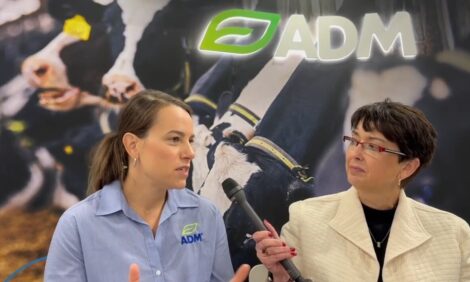



venture | dairy Launches Initiative to Help Dairy Farmers
ANALYSIS - venture | dairy is embarking on a new enterprise-based initiative to help small holder dairy farmers in emerging markets increase productivity and profitability, including improved milk yields, through knowledge, technology and capital, writes Sarah Mikesell, TheDairySite senior editor.Trevor Tomkins, Ph.D. and recently retired chief executive officer of Milk Specialties Global, looked outside the traditional aid and assistance models to create an enterprise-based development organization - venture | dairy - whose mission is to work with partners around the globe to build and sustain these enterprises for the benefit of individual producer families and their communities.
The launch of venture | dairy comes as the global demand for milk continues to rapidly increase, outpacing supply in much of the developing world. Promoting social entrepreneurship and international development, Tomkins and the venture | dairy organization is working to increase the efficiency and productivity of small-scale dairy production in emerging markets. This in turn, is expected to demonstrate significant residual benefits not just for the producers and their communities, but also for long-term economic stability and for the environment.

"venture | dairy was founded to empower dairy entrepreneurs to establish sustainable business practices that can improve their lives, the lives of their families and their communities," said Tomkins. "This is the driving force behind our organization."
What is venture | dairy?
Structured to produce measurable outcomes, venture | dairy is both a not-for-profit organization and a for-profit social investment fund. The not-for-profit operation prepares dairy enterprises to thrive by supporting technology advancement and training in dairy production, and coaching those involved through the fundamentals of business and value-chain development.
The social investment fund provides access to affordable, patient capital in the form of loans or equity that can be used to procure equipment, purchase feed, build infrastructure and oversee operations. Combining the strengths of a not-for-profit organization and an impact-driven social investment fund, venture | dairy allows donors and investors to support the organization's initiatives in ways that best meet their financial and philanthropic goals.
"venture | dairy's impact component is in the quantifiable returns it will provide for investors and the entrepreneurs it helps," explained Tomkins. "Our fund is designed to benefit both the entrepreneurs in the developing economies and the investors in the fund who will see real and measureable results."
The organization's inaugural project is the formation of a Cattle Hub in Nicaragua that will work with farmers to provide services and products to improve milk production and farm profitability. The Nicaraguan dairy company, Centrolac, is one of the partners in the project. And Tetra Laval Food for Development Office, who works in close partnership with governments, development agencies, NGOs, local dairies and farmers to deliver 6.7 billion packages of milk and other nutritious drinks to 51 million children in schools in over 50 countries around the world, will serve as an advisor.
venture | dairy is also undertaking a feasibility study in Rwanda to determine whether that country's developing dairy industry can be helped by construction of a dairy processing plant.
How Did venture | dairy Come to Life?
The idea for venture | dairy came from Tomkins' years of business travel and living in other countries, including South Africa.
"My wife and I had planned to stay in South Africa for one year, but we ended up staying four," he said. "The experience was really an incredible opening of eyes in terms of the world, and understanding people don't have the same opportunities. Some don't have anything close to the same standards of living; we saw poverty up close and personal. And it started to trip a trigger that there has to be a way of helping these smaller farmers by finding opportunities to improve their dairy production."
In 1996, Tomkins became the president of Milk Specialties. Though the company was in a tough financial position, he assumed the challenge of rebuilding it. By 2006, Milk Specialties had seen healthy growth and a new equity group came in - Stonehenge Partners, based in Columbus, Ohio, USA.
"Stonehenge helped 'boost the rocket ship' by bringing in new capital and new ideas," he said. "In the last six years, we built one of the largest specialty milk protein processing companies in the world in terms of processing whey proteins for the health and wellness and sports nutrition industries. Last December, Milk Specialties was sold to the management team and a new private equity group, and I was ready to start my second career in this new development role."
For the last 20 years, Tomkins has been heavily involved with Heifer International, serving as Chair of the Board of Trustees of Heifer International Foundation and on the Board of Directors of Heifer International itself for several years.
"It was during that time that I got to travel into a number of rural economies in Eastern Europe, China, Central and South America," he said. "I saw how extraordinarily potent Heifer International's livestock is in terms of helping change lives. You can give to people and help them get off the bottom rung through the gift of livestock. Lives were changed."

How to Create Change?
Tomkins started to realize that in order to see growth and change, there needed to be ongoing access to the kind of technology and capital that's been missing in much of the developing world.
"Very simply, local banks and institutions don't have the appetite for the risk that's involved with the dairy industry," he said. "The dairy industry requires relatively sophisticated technology and financial instruments if it's going to be successful, because investment in a milk processing plant, for example, costs several million dollars. But a milk processing plant can totally change the lives of a small dairy community. But where do they come up with $3 to $4 million dollars?"
Two years ago, the board of Milk Specialties agreed to establish venture | dairy when Tomkins stepped down as CEO to concentrate on development of the organization. Stonehenge also saw the benefits that the concept of social entrepreneurship with impact investing and philanthro-capital offered through venture | dairy.
"When you look across the world, there are many NGO's and governments that pour a lot of money into particular regions, hoping to change the direction of lives," said Tom Utgard, principal at Stonehenge Partners, at the official launch of venture | dairy in Chicago. "Historically, those changes have only lasted as long as the capital has because they have not built sustainable systems."
Utgard said the concept behind venture | dairy is to put capital to work, but that capital has to be smart capital. The capital has to build a sustainable economic system within a region, because if you don't have a sustainable economic region, there is nothing for people to build around.
"In the financial community today, food and agriculture are a pretty stable environment, and generally are a growing business area for investment," Tomkins said. "When you connect all of this, we've found our purpose: taking technology that is appropriate into the developing communities and also taking in capital."

How Does It Work?
"venture | dairy is a 501(c)(3), not-for-profit, but it is a general partner in the investment fund, as well," he said. "This is a unique structure, but one that the developing world is going to see more and more."
A 501(c)(3) works well because grants are still needed to help developing organizations get to the stage where they're really ready to receive capital, he said. With social philanthropy, the big problem is that there's a lot of money out there, but there aren't many opportunities to invest because organizations aren't set-up for it.
A 501(c)(3) will be the grounded organization, offering grants, technology, training and assistance, and the investment fund will take in the capital-informed loans or formal equity.
"It's not necessary to turn it in three to five years," he said. "Because it's slower, and we're not looking for the venture capital returns that one might typically look for in a sort of classic startup. We're looking for a reasonable investment; it may well be better than the standards for the stock markets. If you get 7 to 10 per cent return, you're doing quite well - if you can get 15 per cent, you're doing very well."
Those sorts of returns are quite possible because of the whole demand for the end product - meat, milk and milk products, he said.
Who Should Invest?
venture | dairy is looking for investment from organizations, high net-worth individuals, family foundations, and people who value the concept and share its ideals. He said investors interested in agriculture are also connecting with them.
"Some people prefer to give some money to the 501(c)(3), because they've really got a philanthropic bent, but we think that more and more people in today's environment are looking for an investment," he said. "They want to see something really tangible. So they'd be able to invest, for example, specifically in our projects in Nicaragua or Rwanda."
This article is the first in a three-part series. Watch for future articles about how venture | dairy is building a Cattle Hub in Nicaragua and its plans for Rwanda and other countries. To go to the venture | dairy website, click here.



